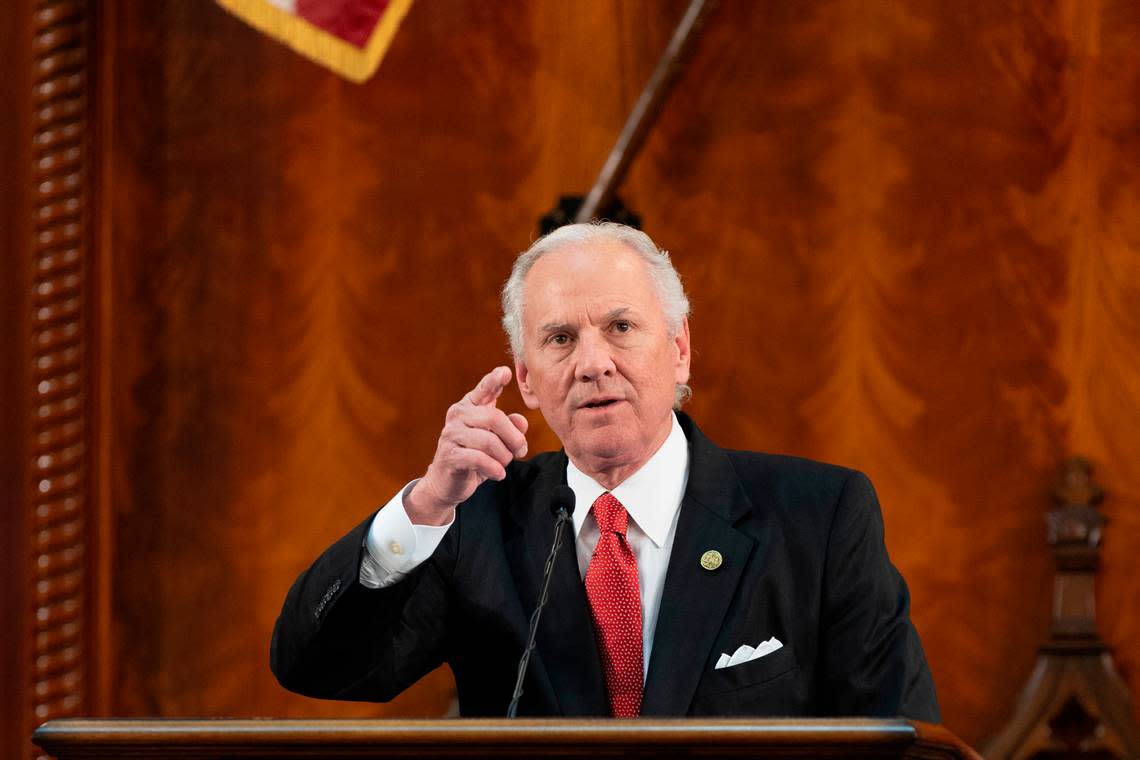SC governor signs $14.5 billion state budget. What did he cut in his 21 vetoes?

- Oops!Something went wrong.Please try again later.
Gov. Henry McMaster on Wednesday signed the state’s $14.5 billion spending plan for the next 12 months, which includes an accelerated income tax cut.
But McMaster did not give the OK to all spending. His 21 vetoes cut $2.29 million out of the budget in earmarks, spending proposals and provisos. Lawmakers can return to Columbia to override those actions, but legislative leaders have indicated they don’t plan to return to override vetoes.
Some of the earmarks McMaster struck down included entities or organizations not registered as charities with the secretary of state, had not submitted an accurate annual financial report or had expired charity statuses.
These were My Community’s Keeper Mentor Group — Advance Peace, N.O.W.W. Empowerment House and Community Projects, SC Center for Visual Arts — Downtown Building Revitalization Acquisition and An African American Settlement Community Historic Commission for a Long Point School House Restoration.
McMaster said other vetoes were necessary because the spending was not appropriate. For some of the proposals, there is a clear idea and path of how the money is spent, but for others, it’s less transparent.
The governor also vetoed two budget provisos related to that would have made it easier for property owners to stop state decisions that are intended to protect the public beach. One would have compensated oceanfront landowners accused of violating a beach management law that protects the seashore for the public, if they won their legal cases.
Last year the governor vetoed about $1.3 million out of the $13.8 billion spending plan and lawmakers did not try to reinstate the spending.
McMaster made it clear that he believes there is a better way to go about the earmark process, and again proposed a grants program.
“I don’t think the public has confidence in this earmark procedure,” McMaster said. “Most people don’t even know there is money available for these things. This is just not the way to spend the people’s money.”
McMaster has been a strong advocate for a grants program instead of the current earmark process, but when asked why he wouldn’t just veto all the earmarks until the legislature puts together a grants commission, he said some of the earmarks are good and have a very worthwhile purpose.
“It would be unnecessary, McMaster said.
Income tax cut, teacher pay become law
South Carolina residents will see the top income tax rate drop to 6.2% as part of the budget. The top tax rate already had dropped from 6.4% to 6.3% this year as part of a phased reduction in the income tax rate is part of a phased-in cut that will bring the maximum income tax rate to 6%.
Budget writers used surplus sales tax money to accelerate the income tax cut.
Budget writers sent $200 million more for state aid to classrooms, which will raise the starting teacher pay in the state to $47,000. McMaster has said he wants to bring the starting salary for teaches to $50,000 a year by 2026 as part of an effort to address the growing teacher shortage in the state.
“We recognize how important our teachers are and we hope to reach that goal and succeed it,” McMaster said.
The budget includes a $1,125 or 2.25% raise for state employees, which ever is greater.
Budget writers included $125 million for Clemson University to spend towards the construction of its veterinary school. The school hoped for $175 million, so it will need to borrow $50 million to complete the project.
The budget includes $100 million for the University of South Carolina for construction of the university’s health campus.
The state also will spend $20 million on school safety upgrades and $5 million to create school building maps.
The budget includes $69 million to colleges and universities to allow them to freeze tuition rates for in-state students for the sixth consecutive year.
Lawmakers also included $30 million to move the Departments of Public Health, Mental Health, Disability and Special Needs, Alcohol and Other Drug Abuse Services to move to 400 Otarre Parkway in Cayce as the state creates a health care campus.
Lawmakers spent $30 million toward rural infrastructure, $200 million for bridges and $117 million for rural road safety.
The state attorney general’s office is receiving an additional $1.575 million a year to create a violent crimes prosecution task force to help prosecutors around the state address a violent crimes case backlog.
The budget includes $2 million for more school resource officers.
The department of corrections also is set to receive $10.9 million for its cell phone interdiction program to keep inmates from making unauthorized phone calls.
The Department of Juvenile Justice also gets $15 million to implement its master facility plan.
$4.2 million for an audit of the $1.8 billion account.
The state also will spend an additional $103 million a year in increased Medicaid costs which includes higher rates for behavioral health providers.
The Department of Social Services received an additional $5 million a year for child welfare stability, $1.1 million a year to address senior hunger and food insecurity and $2.5 million for working family child care scholarship and support.

